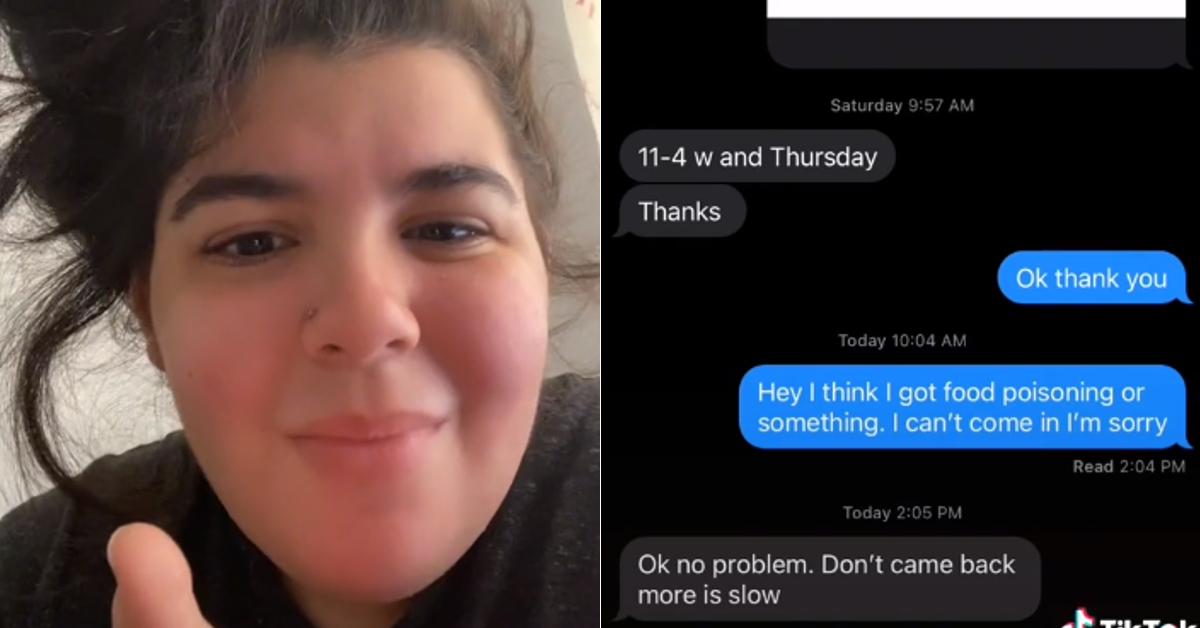Job Loss and Social Media Presence

Tiktoker fired – In today’s digital age, social media has become an integral part of our lives. We use it to connect with friends and family, share our thoughts and experiences, and stay informed about the world around us. However, our online presence can also have a significant impact on our professional lives.
The recent firing of a TikToker for violating company policy has sparked a debate about the boundaries of acceptable behavior on social media. While some argue that the company was justified in its actions, others believe that the punishment was too harsh.
Amidst this controversy, Southwest Airlines has announced its annual birthday sale, offering significant discounts on flights for a limited time. The sale is a reminder that even in the face of adversity, there are still opportunities to find joy and escape.
In recent years, there have been a number of cases of TikTokers who have been fired from their jobs due to their social media content. In some cases, these employees have been fired for posting videos that were deemed to be offensive or inappropriate. In other cases, they have been fired for simply expressing their opinions on controversial topics.
The firing of a TikToker has sparked outrage online, with many questioning the reasons behind the decision. Some have suggested that the firing may have been due to the TikToker’s controversial views on international friendlies. However, the company has not yet released a statement on the matter.
The firing has led to a wider discussion about the role of social media in society and the need for greater transparency from companies.
Impact of Social Media Scrutiny on Employment
The rise of social media has led to increased scrutiny of employees’ online activity. Employers are now more likely to monitor their employees’ social media accounts, and they may even use this information to make decisions about hiring, firing, and promotion.
This increased scrutiny can have a significant impact on employees’ freedom of expression. Employees may be hesitant to express their opinions on controversial topics for fear of losing their jobs. This can lead to a chilling effect on free speech, and it can make it difficult for employees to participate in public discourse.
Ethical Implications of Employers Monitoring Employees’ Online Activity
There are a number of ethical implications to consider when employers monitor their employees’ online activity. First, it raises concerns about privacy. Employees have a right to privacy, and their employers should not be able to monitor their online activity without their consent.
Second, it raises concerns about discrimination. Employers may use information from employees’ social media accounts to discriminate against them based on their race, religion, gender, or sexual orientation. This is illegal, and it can have a devastating impact on employees’ lives.
Legal Protections and Employee Rights: Tiktoker Fired

Employees who are fired for their social media activity may have legal protections under the National Labor Relations Act (NLRA). The NLRA protects employees’ rights to engage in “concerted activities” for the purpose of collective bargaining or other mutual aid or protection. This includes the right to discuss working conditions and other workplace issues on social media.
However, the NLRA does not protect all social media activity. Employers can still fire employees for social media posts that are:
– Defamatory or harassing
– Threatening or violent
– Discriminatory
– Violate company policies
Case Studies
In 2020, a TikToker named Joshue Guzman was fired from his job at a grocery store after he posted a video of himself dancing in the store’s uniform. Guzman sued his employer, alleging that he was fired for exercising his right to free speech. The case is still pending.
In 2021, a TikToker named Tatiana Salem Levy was fired from her job at a marketing agency after she posted a video of herself criticizing her employer’s COVID-19 safety protocols. Levy sued her employer, alleging that she was fired for engaging in protected concerted activity. The case is still pending.
These cases highlight the complex legal issues that can arise when employees are fired for their social media activity. The outcome of these cases will likely have a significant impact on the rights of employees to engage in social media activity in the workplace.
Employer Perspectives and Policy Considerations

Employers face unique concerns regarding TikToker firings. They must balance the need to maintain a professional workplace with the rights of employees to express themselves on social media.
Best practices for employers include:
- Establishing clear social media policies that Artikel acceptable and unacceptable behavior.
- Providing training to employees on the company’s social media policy.
- Monitoring employee social media use to ensure compliance with the policy.
Creating Clear and Effective Social Media Policies, Tiktoker fired
Effective social media policies should be clear, concise, and easy to understand. They should address the following issues:
- Acceptable and unacceptable social media use.
- Consequences for violating the policy.
- Procedures for reporting violations.
News of a TikToker being fired for posting a video of himself dancing on a Southwest Airlines flight has sparked outrage. While some argue that the airline overreacted, others believe that the employee’s behavior was inappropriate. Amidst the controversy, Southwest Airlines has announced its birthday sale , offering significant discounts on flights.
Despite the firing incident, Southwest remains a popular choice for travelers seeking affordable and convenient air travel.
The recent firing of a popular TikToker has sparked a debate about the ethics of social media censorship. While some argue that the platform is justified in removing content that violates its terms of service, others worry that this could lead to a slippery slope where free speech is suppressed.
The debate is particularly relevant in the context of the upcoming match between the USA and Colombia, which is expected to be closely contested. The outcome of the match could have a significant impact on the political landscape in both countries, and it is important that all voices are heard in the lead-up to the event.
Click here for more information on the match.
The recent firing of a TikToker for inappropriate behavior during a live stream highlights the need for responsible online conduct. While social media platforms like TikTok offer opportunities for entertainment and connection, they also require users to adhere to community guidelines.
The incident underscores the importance of using these platforms with respect and consideration, particularly when discussing sensitive topics such as the Copa America tournament, which has sparked controversy over its handling of player safety and its impact on the global pandemic.